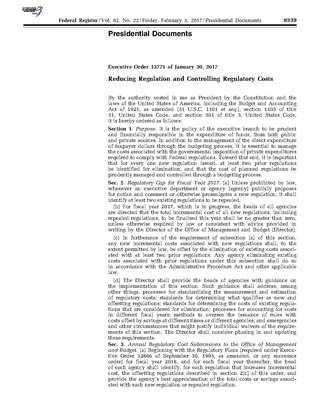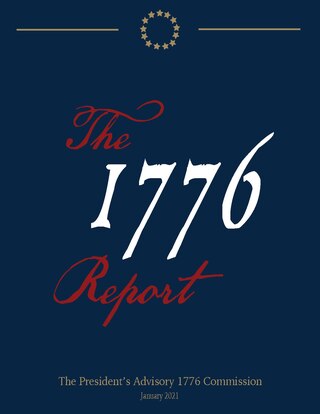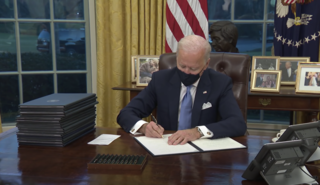
Executive Order 11246 was an executive order of the Article II branch of the U.S. Federal government, in place from 1965 to 2025, specifying non-discriminatory practices and affirmative action in federal government hiring and employment.
The President's Committee on the Arts and the Humanities (PCAH) is an advisory committee to the President of the United States on cultural issues. It works directly with the White House and the three primary cultural agencies: the National Endowment for the Arts (NEA), National Endowment for the Humanities (NEH), and the Institute of Museum and Library Services (IMLS), as well as other federal partners and the private sector, to advance wide-ranging policy objectives in the arts and humanities. These include considerations for how the arts and humanities sectors can positively impact community well-being, economic development, public health, education, civic engagement, and climate change across the United States.

The White House Initiative on Asian Americans, Native Hawaiians, and Pacific Islanders (WHIAANHPI) is a United States governmental office that coordinates an ambitious whole-of-government approach to advance equity, justice, and opportunity for Asian Americans, Native Hawaiians, and Pacific Islanders. The Initiative collaborates with the Deputy Assistant to the President and AA and NHPI Senior Liaison, White House Office of Public Engagement and designated federal departments and agencies to advance equity, justice, and opportunity for AA and NHPIs in the areas of economic development, education, health and human services, housing, environment, arts, agriculture, labor and employment, transportation, justice, veterans affairs, and community development.
Affirmatively Furthering Fair Housing (AFFH) is a provision of the 1968 federal Fair Housing Act signed into law by President Lyndon B. Johnson. The law requires that "All executive departments and agencies shall administer their programs and activities relating to housing and urban development in a manner affirmatively to further the purposes of" the Fair Housing Act. The law also requires the Secretary of the United States Department of Housing and Urban Development (HUD) to administer all HUD programs in a manner that affirmatively furthers fair housing.

Executive Order 13771 —entitled "Reducing Regulation and Controlling Regulatory Costs"— was an executive order signed by U.S. President Donald Trump on January 30, 2017.

Russell Thurlow Vought is an American government official who served as the director of the Office of Management and Budget (OMB) from July 2020 to January 2021. Before assuming this role, he was deputy director of the OMB for part of 2018, and served as acting director from 2019 to 2020.
Centers for Faith and Opportunity Initiatives are bodies within U.S. federal government agencies giving religious groups more voice in government programs. The executive order on the "Establishment of a White House Faith and Opportunity Initiative" issued in May 2018 during the presidency of Donald Trump requires all executive departments to designate a Liaison for Faith and Opportunity Initiatives to coordinate with a new Advisor to the White House.

The 1776 Commission, also nicknamed the 1776 Project, is an advisory committee established in September 2020 by then-U.S. President Donald Trump to support what he called "patriotic education". The commission released The 1776 Report on January 18, 2021, two days before the end of Trump's term of office. Historians overwhelmingly criticized the report, saying it was "filled with errors and partisan politics". The commission was terminated by the successive President Joe Biden on January 20, 2021, his first day in office. It was re-established by Trump in January 2025.
Schedule Policy/Career, commonly known by its former name Schedule F, is a job classification for appointments in the excepted service of the United States federal civil service for permanent policy-related positions. The purpose of the provision is to increase the president's control over the federal career civil service by removing their civil service protections and making them easy to dismiss, which proponents stated would increase flexibility and accountability to elected officials. It was widely criticized as providing means to retaliate against federal officials for political reasons, impede the effective functioning of government, and providing risk to democracy. It has been estimated that tens or hundreds of thousands of career employees could be reclassified, increasing the number of political appointments by a factor of ten.

Matthew E. Ammon is an American governmental official who serves as director of the Office of Lead Hazard Control and Healthy Homes in the United States Department of Housing and Urban Development. He is also serving as acting United States Secretary of Housing and Urban Development in the second Trump administration since January 20, 2025, having previously served in the same role for the Biden administration from January to March 2021. Ammon served an interim capacity until Biden's nominee, Marcia Fudge, was confirmed by the United States Senate on March 10, 2021.
The social policy of the Joe Biden administration is intended to improve racial equity, increase access to safe and legal abortions, tighten restrictions on gun sales, among other aims. A number of policies aim to reverse the former policies of President Donald Trump, including the "Muslim" travel ban and loosened anti-discriminatory policies relating to LGBT people.
The Joe Biden administration pledged to pass government ethics reform. The Biden administration also pledged to pass legislation and enforce policies to enforce electoral reform, in response to the influence of special interests and gerrymandering in elections.

Executive Order 13988, officially titled Preventing and Combating Discrimination on the Basis of Gender Identity or Sexual Orientation, was the fourth executive order signed by U.S. President Joe Biden on January 20, 2021. It was rescinded by Donald Trump within hours of his assuming office on January 20, 2025.

Executive Order 13990, officially titled Protecting Public Health and the Environment and Restoring Science to Tackle the Climate Crisis is an executive order signed by President Joe Biden on January 20, 2021, which implements various environmental policies of his administration including revoking the permit for the Keystone XL Pipeline and temporarily prohibiting drilling in the arctic refuge. It was rescinded by Donald Trump within hours of his assuming office on January 20, 2025.
Executive Order 13995, officially titled Ensuring an Equitable Pandemic Response and Recovery, was signed on January 21, 2021, and was the eleventh executive order signed by U.S. President Joe Biden. The order works to guarantee a fair response and recovery from the COVID-19 pandemic. It was rescinded by Donald Trump within hours of his assuming office on January 20, 2025.
Executive Order 13992, officially titled Revocation of Certain Executive Orders Concerning Federal Regulation, was signed on January 20, 2021, and is the eighth executive order signed by U.S. President Joe Biden. The order works to withdraw certain federal regulation executive orders from the previous Trump administration. It was rescinded by Donald Trump within hours of his assuming office on January 20, 2025 following his re-election to his second, nonconsecutive term.
Executive Order 14173, titled "Ending Illegal Discrimination And Restoring Merit-Based Opportunity", is an executive order signed by Donald Trump, the 47th President of the United States, on January 21, 2025. The executive order instructs federal departments not to issue contracts to private organizations that enforce diversity, equity, inclusion and accessibility (DEIA) frameworks. The order does not affect state or lower jurisdiction level DEIA related government contracting practices. It specifically prevents affirmative action from being implemented by government contractors. The order also revoked certain parts of the Equal Employment Opportunity (EEO) order that was signed by Lyndon B. Johnson in 1965, as well as other orders, in terms of federal contracting jobs. The order also requests federal agencies to start an investigation on 9 publicly traded companies.
Executive Order 14148, entitled "Initial Rescissions of Harmful Executive Orders and Actions" is an executive order signed by United States president Donald Trump on January 20, 2025, during the first day of his second presidential term. The order directed the rescindment of several executive orders enacted during the Biden administration.
Executive Order 14179, titled "Removing Barriers to American Leadership in Artificial Intelligence", is an executive order signed by Donald Trump, the 47th President of the United States, on January 23, 2025. The executive order aims to initiate the process of Strengthen U.S. leadership in artificial intelligence, promote AI development free from ideological bias or social agendas, establish an action plan to maintain global AI dominance, and to revise or rescind policies that conflict with these goals.









